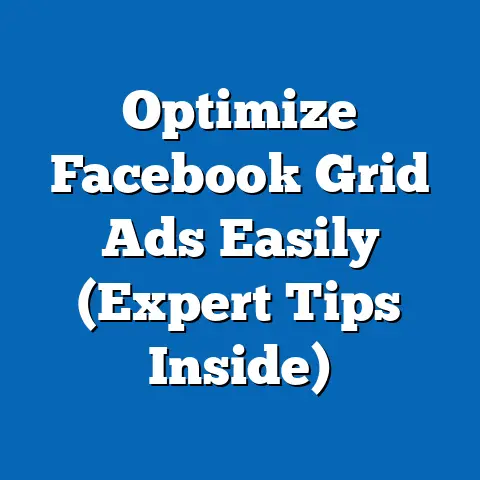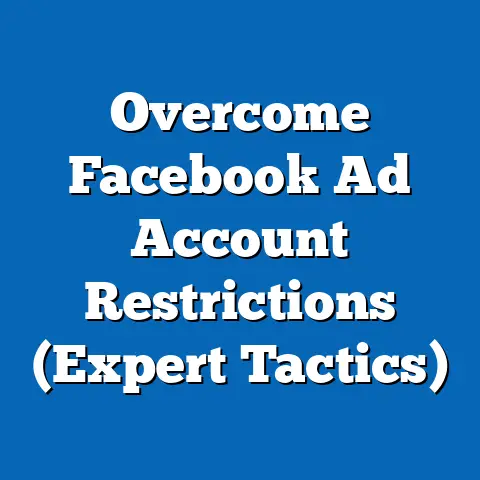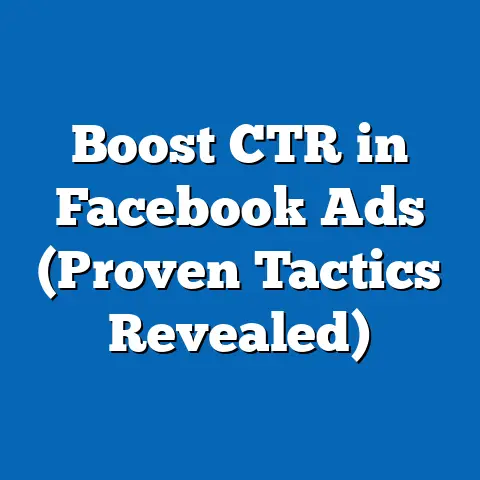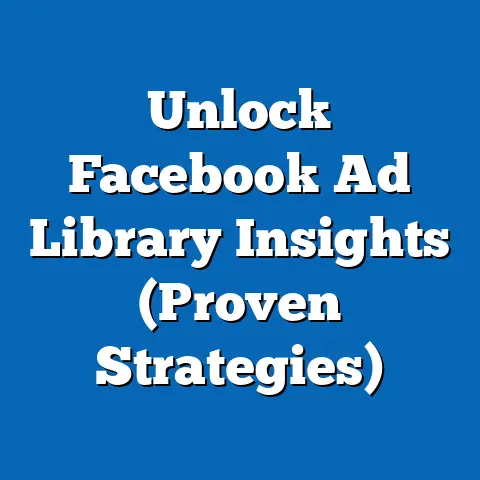Unlock Facebook Ads Manager for Free (Expert Strategies Inside)
Unlocking Facebook Ads Manager for Free: Expert Strategies for Maximizing Digital Marketing Impact
Introduction: A Surprising Fact to Start
Did you know that over 10 million active advertisers use Facebook Ads Manager to reach a global audience of more than 2.9 billion monthly active users, yet a significant portion of small businesses and individual entrepreneurs believe they must pay substantial fees just to access this powerful tool?
Contrary to common misconceptions, Facebook Ads Manager is entirely free to use—its core features, including campaign creation, audience targeting, and performance tracking, are accessible without any upfront cost.
This surprising accessibility democratizes digital advertising, allowing anyone from solopreneurs to multinational corporations to compete on a relatively level playing field, provided they know how to leverage the platform effectively.
This article delves into the intricacies of unlocking the full potential of Facebook Ads Manager for free, exploring its defining characteristics as a marketing tool, the historical context of its development, and the broader societal implications of its widespread adoption.
By combining expert strategies with data-driven insights, we aim to equip readers with actionable knowledge to navigate this platform without incurring unnecessary costs.
We will also examine the technological, economic, and cultural factors that shape its use, while addressing the nuances and challenges of mastering its features.
Defining Characteristics of Facebook Ads Manager
Facebook Ads Manager is a centralized platform designed to create, manage, and analyze advertising campaigns across Facebook, Instagram, Messenger, and the Audience Network.
Launched as part of Meta’s broader ecosystem, it offers users a suite of tools to target specific demographics, track ad performance in real time, and optimize campaigns for maximum return on investment (ROI).
Unlike paid third-party advertising tools, Ads Manager’s core functionality is free, though users must allocate a budget for the ads themselves.
Key defining features include granular audience targeting based on age, location, interests, and behaviors; a variety of ad formats such as images, videos, carousels, and stories; and robust analytics dashboards that provide insights into impressions, clicks, and conversions.
Additionally, the platform supports A/B testing to compare different ad variations and automated rules to streamline campaign management.
These characteristics make it a versatile tool for advertisers of all experience levels, though its complexity can be daunting for beginners without proper guidance.
Another critical aspect is its integration with Meta’s vast data ecosystem, which allows for hyper-personalized advertising.
While this raises ethical questions about privacy—a topic we will explore later—it also empowers advertisers to reach highly relevant audiences at no additional cost for the tool itself.
Understanding these features is the first step to unlocking its potential without relying on expensive external services or software.
Historical Context: The Evolution of Facebook Ads Manager
To fully appreciate the significance of Facebook Ads Manager, it’s essential to understand the historical context of digital advertising and Meta’s role in shaping it.
When Facebook launched in 2004, it was primarily a social networking platform with no advertising infrastructure.
However, by 2007, the company introduced its first ad product, “Facebook Flyers,” allowing businesses to promote content to users for a small fee.
The real turning point came in 2012 with the introduction of a more sophisticated self-service advertising platform, which evolved into what we now know as Facebook Ads Manager.
This coincided with Facebook’s initial public offering (IPO) and a strategic shift toward monetization through advertising revenue, as the platform sought to capitalize on its growing user base.
By 2015, Ads Manager had become a cornerstone of Meta’s business model, generating billions in revenue annually while remaining free for advertisers to access.
This period also saw the rise of mobile internet usage, with smartphones becoming ubiquitous.
Facebook Ads Manager adapted by prioritizing mobile-first ad formats and targeting capabilities, reflecting broader technological trends.
The platform’s development paralleled significant societal shifts, including the growth of e-commerce and the increasing importance of digital presence for businesses during and after the 2008 financial crisis.
Additionally, regulatory changes, such as the European Union’s General Data Protection Regulation (GDPR) in 2018, forced Meta to refine Ads Manager’s data usage policies, balancing advertiser needs with user privacy concerns.
These historical milestones highlight how external economic, technological, and legal factors have shaped the platform into a free yet powerful tool for digital marketing.
Societal Implications of Free Access to Facebook Ads Manager
The free availability of Facebook Ads Manager has far-reaching implications across multiple societal domains, including economic equity, cultural influence, and ethical considerations.
Economically, it lowers the barrier to entry for small businesses and individual entrepreneurs who may lack the budget for traditional advertising channels like television or print media.
By providing free access to a platform with global reach, Meta enables these players to compete with larger corporations, fostering innovation and diversity in the marketplace.
Culturally, the platform has amplified the spread of ideas, trends, and movements through targeted advertising.
Nonprofits, activists, and community organizers can use Ads Manager to promote causes or events at minimal cost, provided they invest in ad spend strategically.
However, this also raises concerns about the potential for misinformation or manipulative content, as seen during high-profile events like the 2016 U.S.
presidential election, where targeted ads were used to influence voter behavior.
From an ethical standpoint, the free nature of Ads Manager must be weighed against the platform’s reliance on user data for targeting.
While advertisers pay nothing to use the tool, Meta profits from the data collected from billions of users, often without transparent consent.
This dynamic has sparked debates about privacy rights and the societal cost of “free” digital tools, prompting calls for stricter regulations and greater user control over personal information.
Moreover, the accessibility of Ads Manager has reshaped the workplace, creating demand for digital marketing skills and new job roles like social media managers and ad specialists.
As businesses increasingly rely on digital advertising, proficiency in tools like Ads Manager has become a valuable asset, influencing education and training programs worldwide.
These societal shifts underscore the dual nature of free access—empowering yet complex, with both opportunities and challenges.
Technological Factors: Navigating a Data-Driven Platform
At its core, Facebook Ads Manager is a product of technological innovation, leveraging artificial intelligence (AI), machine learning, and big data to deliver personalized ad experiences.
The platform’s algorithm, often referred to as the “delivery system,” determines which ads are shown to users based on relevance, bid amount, and estimated action rates (e.g., likelihood of a click or purchase).
This technology allows advertisers to achieve results without paying for access to the tool itself, though mastering the algorithm requires time and experimentation.
One key technological feature is the “Lookalike Audiences” tool, which uses AI to identify users similar to an advertiser’s existing customer base, expanding reach at no extra cost beyond ad spend.
Similarly, the “Pixel” tracking code—a free snippet of code placed on a website—enables advertisers to monitor user behavior and measure ad effectiveness.
These tools exemplify how technology underpins the platform’s value, making it accessible yet sophisticated.
However, technological complexity can be a barrier.
The platform’s frequent updates and intricate settings often overwhelm new users, leading some to seek paid courses or consultants despite the free nature of Ads Manager.
Additionally, reliance on Meta’s infrastructure means advertisers must adapt to changes in algorithms or policies, which can disrupt campaigns without warning.
Understanding these technological factors is crucial for leveraging Ads Manager effectively without incurring unnecessary expenses.
Economic Influences: Cost-Effective Marketing in a Digital Age
Economically, the free availability of Facebook Ads Manager aligns with broader trends toward cost-effective digital marketing solutions.
Traditional advertising channels often require significant upfront investments, whereas Ads Manager allows users to start with as little as $1 per day for ad spend.
This flexibility has made it a go-to tool for startups and small businesses, particularly during economic downturns when budgets are tight.
Data from Statista (2023) reveals that digital ad spending worldwide reached $626 billion in 2022, with a substantial portion allocated to platforms like Facebook.
The free access to Ads Manager has contributed to this growth by enabling businesses of all sizes to participate in digital advertising.
Moreover, the platform’s auction-based pricing model ensures that advertisers only pay for results (e.g., clicks or impressions), maximizing cost efficiency.
Yet, economic disparities still influence outcomes.
While the tool is free, success often depends on the ability to invest in high-quality creative content or larger ad budgets, which can disadvantage smaller players.
Additionally, economic conditions, such as inflation or recession, impact consumer behavior, requiring advertisers to adjust strategies within Ads Manager to maintain ROI.
These economic dynamics highlight the importance of strategic planning to fully unlock the platform’s free potential.
Social and Cultural Dimensions: Shaping and Reflecting Trends
Socially and culturally, Facebook Ads Manager both shapes and reflects the zeitgeist of the digital age.
It serves as a mirror to societal interests, with advertisers tailoring campaigns to trending topics, memes, or cultural events to capture attention.
For instance, during global events like the COVID-19 pandemic, businesses used Ads Manager to pivot messaging toward remote services or safety protocols, demonstrating its role in addressing real-time social needs.
The platform also influences cultural norms by amplifying certain voices or products.
Viral ad campaigns can redefine consumer preferences or spark cultural conversations, as seen with brands like Dove or Nike using targeted ads to promote social messages.
However, this power comes with responsibility, as poorly designed campaigns can perpetuate stereotypes or alienate audiences, underscoring the need for cultural sensitivity in advertising.
Within generations, usage of Ads Manager varies.
Younger demographics, such as Gen Z, often expect brands to engage authentically through ads on Instagram (managed via Ads Manager), while older users on Facebook may respond to more traditional formats.
Advertisers must navigate these social and cultural nuances to craft effective campaigns, recognizing that a one-size-fits-all approach rarely succeeds in a diverse digital landscape.
Expert Strategies for Unlocking Facebook Ads Manager for Free
Having explored the broader context, let’s dive into actionable strategies to maximize Facebook Ads Manager without paying for access or external tools.
These expert tips are grounded in best practices and insights from digital marketing professionals, ensuring that users of all levels can achieve results.
1. Master Audience Targeting Without Paid Tools
One of the most powerful free features of Ads Manager is its audience targeting capabilities.
Start by using the “Detailed Targeting” option to define your audience based on demographics, interests, and behaviors—data that Meta provides at no cost.
For example, a local bakery can target users within a 10-mile radius who have shown interest in baking or desserts.
Next, leverage “Custom Audiences” by uploading a list of existing customers or website visitors (via the free Pixel tool) to re-engage them with tailored ads.
Then, use “Lookalike Audiences” to find similar users, expanding your reach without additional tools.
According to a 2022 study by Hootsuite, campaigns using Lookalike Audiences saw a 30% higher conversion rate on average, proving the value of this free feature.
Avoid overcomplicating targeting; start narrow and scale up based on performance data.
This iterative approach ensures you’re not wasting ad spend while learning the platform’s nuances for free.
2. Optimize Ad Creative with Free Resources
High-quality ad creative is essential for engagement, and you don’t need expensive design software to achieve it.
Use free tools like Canva or Meta’s built-in ad creation features to design visually appealing images or videos.
Focus on clear, concise messaging that aligns with your brand and resonates with your audience.
Test multiple ad formats—such as single images, carousels, or short videos—using the free A/B testing feature in Ads Manager to identify what works best.
Data from WordStream (2023) indicates that video ads on Facebook have a 6% higher click-through rate than static images, making them worth experimenting with at no extra cost.
Remember to refresh creatives regularly to avoid “ad fatigue,” where users stop engaging with repetitive content.
This strategy keeps campaigns effective without requiring paid resources.
3. Utilize Free Analytics for Data-Driven Decisions
Ads Manager’s built-in analytics dashboard is a goldmine for optimizing campaigns without external software.
Monitor key metrics like click-through rate (CTR), cost per click (CPC), and conversion rate to assess performance.
Use the “Breakdowns” feature to analyze results by demographic, placement, or device, gaining insights into what drives success.
Set up free automated rules to pause underperforming ads or scale successful ones based on predefined criteria, saving time and budget.
For instance, pause ads with a CTR below 1% after 1,000 impressions to avoid wasting spend.
Experts like Jon Loomer, a digital marketing strategist, emphasize that consistent analysis of free data is more impactful than investing in premium tools for most small to medium-sized advertisers.
4. Start Small and Scale Strategically
One common mistake is over-investing in ad spend before understanding the platform.
Begin with a modest daily budget—Meta allows as little as $1 per day for certain campaigns—and focus on learning through small-scale tests.
Use the free “Campaign Budget Optimization” (CBO) feature to let Meta distribute your budget across ad sets for optimal results.
As you identify winning strategies, gradually increase spend while maintaining a close eye on ROI.
This approach minimizes financial risk while maximizing the learning potential of Ads Manager’s free framework.
Case studies from HubSpot (2023) show that advertisers who start small and scale based on data achieve 25% better cost efficiency over time.
5. Stay Updated with Free Educational Resources
Meta regularly updates Ads Manager, and staying informed is key to maintaining effectiveness without paid training.
Access free resources like Meta Blueprint, a comprehensive learning platform offering courses on everything from basics to advanced targeting.
Join free online communities, such as Facebook groups for advertisers, to exchange tips and troubleshoot issues.
Follow industry blogs and podcasts from experts like Social Media Examiner or Amy Porterfield for the latest strategies at no cost.
Continuous learning ensures you’re leveraging all free features of Ads Manager, even as the platform evolves.
Nuances and Challenges: Avoiding Pitfalls in a Free Platform
While Facebook Ads Manager is free to use, it’s not without challenges that require careful navigation.
The platform’s steep learning curve can frustrate beginners, leading to wasted ad spend if campaigns aren’t set up correctly.
For instance, overly broad targeting or poorly optimized creatives can result in low engagement, even with the best free tools at hand.
Additionally, Meta’s algorithm prioritizes user experience, meaning ads must be relevant and non-intrusive to perform well.
This can be a hurdle for advertisers unfamiliar with crafting compelling content or understanding audience needs.
The platform’s policies on ad content are also strict, with frequent rejections for minor violations, requiring users to stay vigilant without paid compliance tools.
Privacy concerns add another layer of complexity.
While advertisers benefit from Meta’s data-driven targeting, backlash from users and regulators has led to changes like Apple’s iOS 14.5 update in 2021, which limited tracking capabilities.
Advertisers must adapt to these shifts, relying on first-party data and free features like Custom Audiences to maintain effectiveness.
Finally, it’s important to recognize diversity within user experiences.
Not all businesses or individuals will achieve the same results due to differences in industry, audience, or resources for ad creation.
Acknowledging these nuances prevents overgeneralization and encourages a tailored approach to using Ads Manager for free.
Implications for Society, Culture, and the Workplace
The widespread use of Facebook Ads Manager has profound implications beyond individual advertisers.
In society, it contributes to the digital economy by enabling businesses to thrive online, particularly in underserved regions where traditional marketing is cost-prohibitive.
However, it also exacerbates digital divides, as success often correlates with access to technology, internet, and digital literacy—resources not universally available.
Culturally, Ads Manager shapes how information and products are consumed, often accelerating trends or reinforcing biases through targeted content.
The platform’s role in political advertising, for instance, remains controversial, with ongoing debates about its impact on democracy and public discourse.
Balancing cultural influence with ethical responsibility is a key challenge for advertisers and Meta alike.
In the workplace, proficiency in Ads Manager has become a sought-after skill, influencing hiring trends and professional development.
Companies increasingly expect marketing teams to manage digital campaigns in-house, reducing reliance on costly agencies.
Educational institutions are responding by integrating digital advertising into curricula, preparing future generations for a workforce shaped by tools like Ads Manager.
Forward-Looking Insights: The Future of Free Digital Advertising
Looking ahead, the trajectory of Facebook Ads Manager and similar free tools will likely be shaped by technological advancements, regulatory pressures, and evolving user expectations.
AI and machine learning will continue to enhance targeting and optimization, potentially simplifying the platform for beginners while offering deeper customization for experts.
However, as privacy laws tighten globally, Meta may need to rethink data usage, possibly introducing new free features to compensate for restricted tracking.
Economic uncertainties, such as potential recessions, could drive more businesses to rely on cost-effective tools like Ads Manager, increasing competition for ad space and necessitating even sharper strategies.
Culturally, as younger generations prioritize authenticity and sustainability, advertisers will need to adapt campaigns within Ads Manager to reflect these values, ensuring relevance without additional costs.
While the future holds promise, uncertainties remain.
Will Meta maintain free access to Ads Manager as pressure mounts to diversify revenue streams?
How will advertisers navigate a landscape of increasing ad saturation and user fatigue?
These questions underscore the need for continuous adaptation and learning to sustain success with free digital tools.
Conclusion: Empowering Advertisers Through Knowledge and Strategy
Facebook Ads Manager stands as a testament to the power of free digital tools in transforming advertising and leveling the playing field for businesses worldwide.
By understanding its defining characteristics, historical evolution, and societal implications, advertisers can unlock its full potential without incurring unnecessary costs.
Expert strategies—ranging from mastering audience targeting to leveraging free analytics—provide a roadmap for success, while acknowledging challenges ensures a realistic approach to navigating the platform.
As technological, economic, and cultural forces continue to shape digital marketing, the importance of tools like Ads Manager will only grow, influencing society, workplaces, and individual livelihoods.
By staying informed and strategic, advertisers can harness this free resource to achieve meaningful results, contributing to a dynamic and ever-evolving digital landscape.
Though the future is uncertain, one thing is clear: knowledge and adaptability are the true keys to unlocking Facebook Ads Manager for free.





